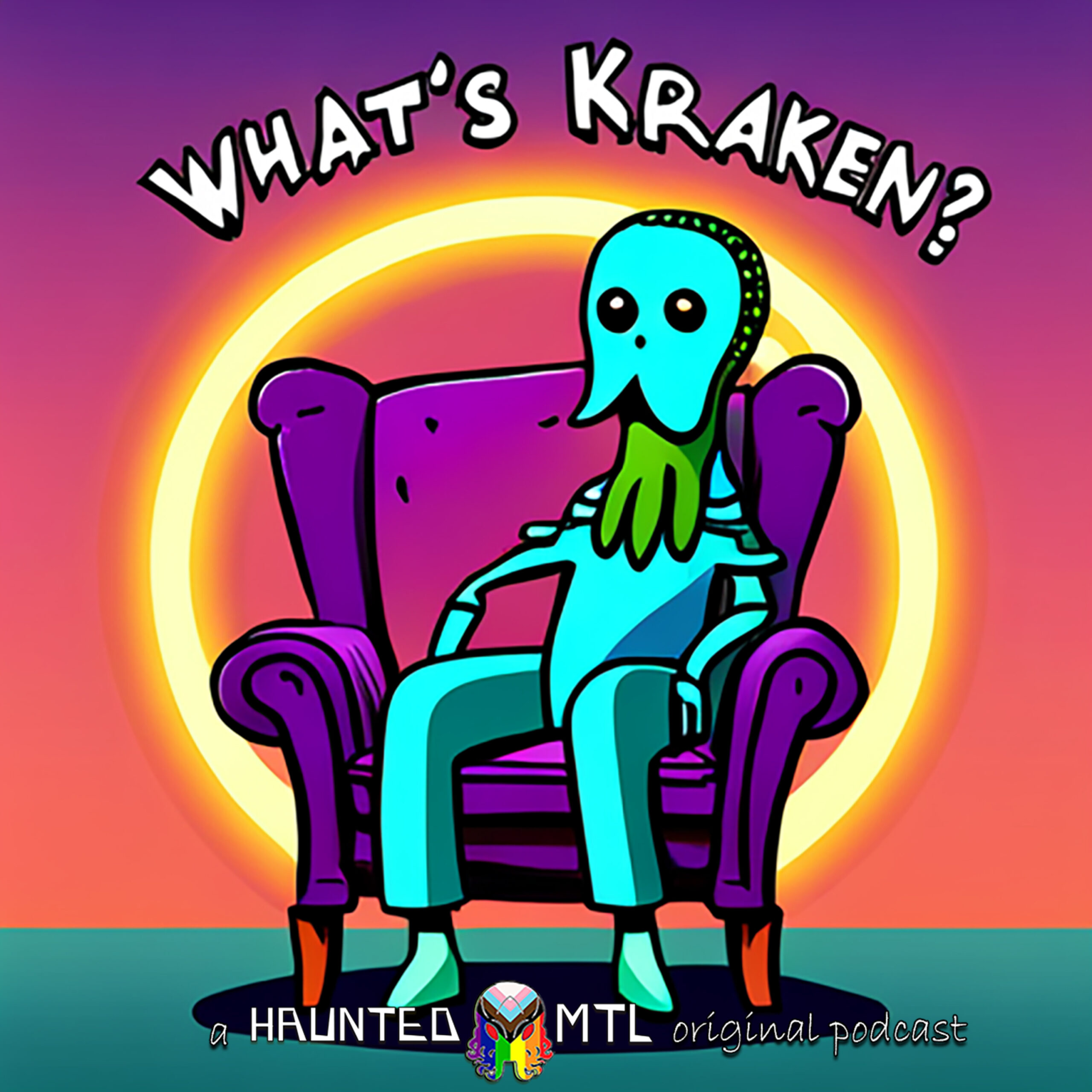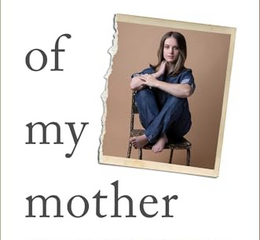Dive deep into the chilling world of serial killers with Jim Phoenix as he welcomes the intriguing and brilliant Rhiannon D’Averc, author of the riveting book “Unmasking the Shadows: A Journey into the Minds of Serial Killers.” In this spine-tingling episode, Rhiannon unveils the dark psychology behind some of the most infamous serial killers in history, drawing from her extensive research and gripping narratives.
You’ll get an exclusive peek into how Rhiannon crafts her compelling true crime stories, her personal encounters with the macabre, and what drives her passion for exploring these dark corners of human nature. From notorious figures to research and getting idea to paper, this episode promises to be a hauntingly educational ride.
PLUS–EXCLUSIVE-Rhiannon reads from her book — It’s a must hear episode of What’s Kraken!

Podcasts - HMTL PodPeople
HORROR’S BEST & WORST MOVIE MOMSA Mother’s Day Special from Empty Hell
What makes a great horror mom? From Silent Hill’s Rose Da Silva to Pamela Voorhees, Empty Hell’s Jo Szewczyk and shark enthusiast JM Brannyk dive into cinema’s most memorable maternal figures. This special episode explores how motherhood shapes some of horror’s most compelling narratives – including a surprisingly deep analysis of maternal instincts in Jaws 3.
EPISODE HIGHLIGHTS:
- Silent Hill – The ultimate mother’s sacrifice
- Aliens – Ripley vs The Queen: A tale of two mothers
- Child’s Play – Single motherhood meets supernatural threat
- Jaws 3 – Maternal instincts under the sea
- Plus some controversial real-life examples that might surprise you
Want more Empty Hell content? Find us on Instagram and Blue Sky, or follow Jo’s author updates on Facebook: https://www.facebook.com/czykmate
Coming Soon: Bruce Campbell special with Brannyk, and a deep dive into Barry with Amelie
Original Creations
Goodbye for Now, a Short Story by Jennifer Weigel
What if ours weren’t the only reality? What if the past paths converged, if those moments that led to our current circumstances got tangled together with their alternates and we found ourselves caught up in the threads?
Marla returned home after the funeral and wake. She drew the key in the lock and opened the door slowly, the looming dread of coming back to an empty house finally sinking in. Everyone else had gone home with their loved ones. They had all said, “goodbye,” and moved along.
Her daughter Misty and son-in-law Joel had caught a flight to Springfield so he could be at work the next day for the big meeting. Her brother Darcy was on his way back to Montreal. Emmett and Ruth were at home next door, probably washing dishes from the big meal they had helped to provide afterward, seeing as their kitchen light was on. Marla remembered there being food but couldn’t recall what exactly as she hadn’t felt like eating. Sandwiches probably… she’d have to thank them later.
Marla had felt supported up until she turned the key in the lock after the services, but then the realization sank deep in her throat like acid reflux, hanging heavy on her heart – everyone else had other lives to return to except for her. She sighed and stepped through the threshold onto the outdated beige linoleum tile and the braided rag rug that stretched across it. She closed the door behind herself and sighed again. She wiped her shoes reflexively on the mat before just kicking them off to land in a haphazard heap in the entryway.
The still silence of the house enveloped her, its oppressive emptiness palpable – she could feel it on her skin, taste it on her tongue. It was bitter. She sighed and walked purposefully to the living room, the large rust-orange sofa waiting to greet her. She flopped into its empty embrace, dropping her purse at her side as she did so.
A familiar, husky voice greeted her from deeper within the large, empty house. “Where have you been?”
Marla looked up and glanced around. Her husband Frank was standing in the doorway to the kitchen, drying a bowl. Marla gasped, her hand shooting to her mouth. Her clutched appendage took on a life of its own, slowly relinquishing itself of her gaping jaw and extending a first finger to point at the specter.
“Frank?” she spoke hesitantly.
“Yeah,” the man replied, holding the now-dry bowl nestled in the faded blue-and-white-checkered kitchen towel in both hands. “Who else would you expect?”
“But you’re dead,” Marla spat, the words falling limply from her mouth of their own accord.
The 66-year old man looked around confusedly and turned to face Marla, his silver hair sparkling in the light from the kitchen, illuminated from behind like a halo. “What are you talking about? I’m just here washing up after lunch. You were gone so I made myself some soup. Where have you been?”
“No, I just got home from your funeral,” Marla spoke quietly. “You are dead. After the boating accident… You drowned. I went along to the hospital – they pronounced you dead on arrival.”
“I don’t know what you’re talking about,” Frank said. “What boating accident?”
“The sailboat… You were going to take me out,” Marla coughed, her brown eyes glossed over with tears.
“We don’t own a sailboat,” Frank said bluntly. “Sure, I’d thought about it – it seems like a cool retirement hobby – but it’s just too expensive. We’ve talked about this, we can’t afford it.”
Marla glanced out the bay window towards the driveway where the small sailboat sat on its trailer, its orange hull reminiscent of the Florida citrus industry, and also of the life jacket Frank should have been wearing when he’d been pulled under. Marla cringed and turned back toward the kitchen. She sighed and spoke again, “But the boat’s out front. The guys at the marina helped to bring it back… after you… drowned.”
Frank had retreated to the kitchen to put away the bowl. Marla followed. She stood in the doorway and studied the man intently. He was unmistakably her husband, there was no denying it even despite her having just witnessed his waxen lifeless body in the coffin at the wake before the burial, though this Frank was a slight bit more overweight than she remembered.
“Well, that’s not possible. Because I’m still here,” Frank grumbled. He turned to face her, his blue eyes edged with worry. “There now, it was probably just a dream. You knew I wanted a boat and your anxiety just formulated the worst-case scenario…”
“See for yourself,” Marla said, her voice lilting with every syllable.
Frank strode into the living room and stared out the bay window. The driveway was vacant save for some bits of Spanish moss strewn over the concrete from the neighboring live oak tree. He turned towards his wife.
“But there’s no boat,” he sighed. “You must have had a bad dream. Did you fall asleep in the car in the garage again?” Concern was written all over his face, deepening every crease and wrinkle. “Is that where you were? The garage?”
Marla glanced again at the boat, plain as day, and turned to face Frank. Her voice grew stubborn. “It’s right here. How can you miss it?” she said, pointing at the orange behemoth.
“Honey, there’s nothing there,” Frank exclaimed, exasperation creeping into his voice.
Marla huffed and strode to the entryway, gathering her shoes from where they waited in their haphazard heap alongside the braided rag run on the worn linoleum floor. She marched out the door as Frank took vigil in its open frame, still staring at her. She stomped out to the boat and slapped her hand on the fiberglass surface with a resounding smack. The boat was warm to the touch, having baked in the Florida sun. She turned back towards the front door.
“See!” she bellowed.
The door stood open, empty. No one was there, watching. Marla sighed again and walked back inside. The vacant house once again enveloped her in its oppressive emptiness. Frank was nowhere to be found.
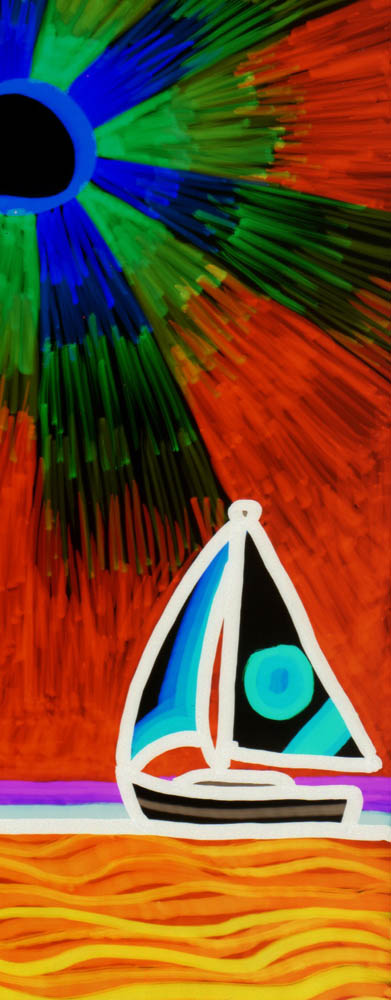
So I guess it’s goodbye for now. Feel free to check out more of Jennifer Weigel’s work here on Haunted MTL or here on her website.
Original Series
Nightmarish Nature: Just Jellies
Today on Nightmarish Nature we’re gonna revisit The Blob and jiggle our way to terror. Why? ‘Cause we’re just jellies – looking at those gelatinous denizens of the deep, as well as some snot-like land-bound monstrosities, and wishing we could ooze on down for some snoozy booze schmoozing action. Or something.
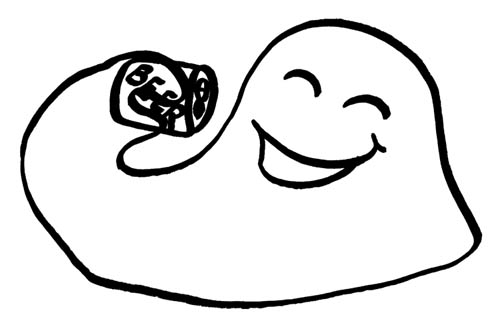
Honestly, I don’t know what exactly it is that jellyfish and slime molds do but whatever it is they do it well, which is why they’re still around despite being among the more ancient organism templates still in common use.
Jellyfish are on the rise.
Yeah, yeah, some species like moon jellies will hang out in huge blooms near the surface feeding, but that’s not what I meant. Jellyfish populations are up. They’re honing in on the open over-fished ocean and making themselves at home. Again.
And, although this makes the sea turtles happy since jellies are a favorite food staple of theirs, not much else is excited about the development. Except for those fish that like to hide out inside of their bells, assuming they don’t accidentally get eaten hanging out in there. But that’s a risk you gotta take when you’re trying to escape predation by surrounding yourself in a bubble of danger that itself wants to eat you. Be eaten or be eaten. Oh, wait…
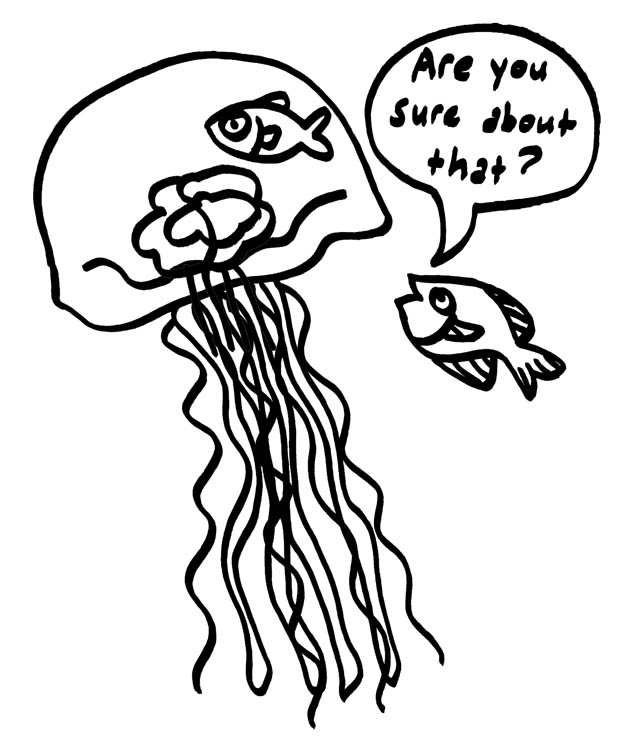
So what makes jellies so scary?
Jellyfish pack some mighty venom. Despite obvious differences in mobility, they are related to anemones and corals. But not the Man o’ War which looks similar but is actually a community of microorganisms that function together as a whole, not one creature. Not that it matters when you’re on the wrong end of a nematocyst, really. Because regardless what it’s attached to, that stings.
Box jellies are among the most venomous creatures in the world and can move of their own accord rather than just drifting about like many smaller jellyfish do. And even if they aren’t deadly, the venom from many jellyfish species will cause blisters and lesions that can take a long time to heal. So even if they do resemble free-floating plastic grocery bags, you’d do best to steer clear. Because those are some dangerous curves.
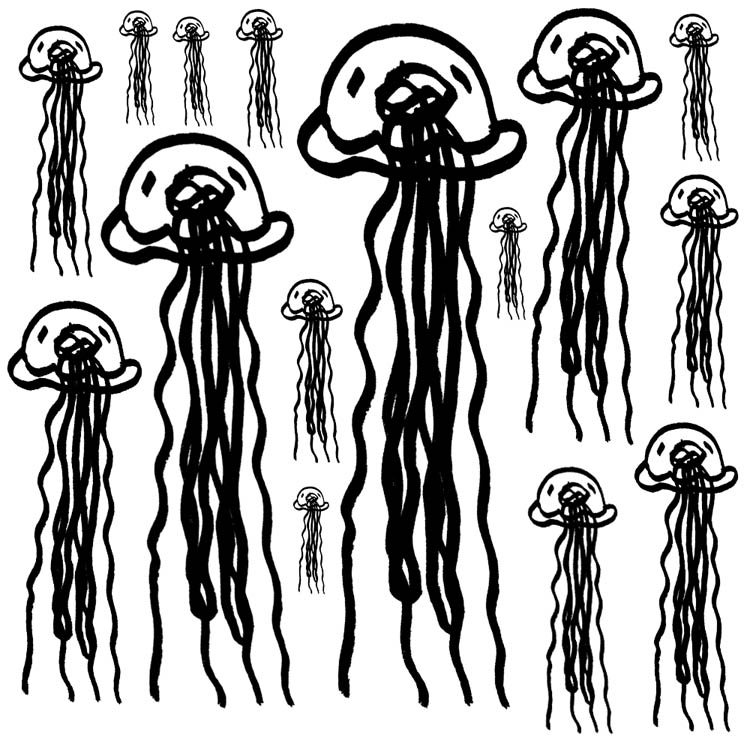
But what does this have to do with slime molds?
Absolutely nothing. I honestly don’t know enough about jellyfish or slime molds to devote the whole of a Nightmarish Nature segment to either, so they had to share. Essentially, this bit is what happened when I decided to toast a bagel before coming up with something to write about and spent a tad too much time in contemplation of my breakfast. I guess we’re lucky I didn’t have any cream cheese or clotted cream…
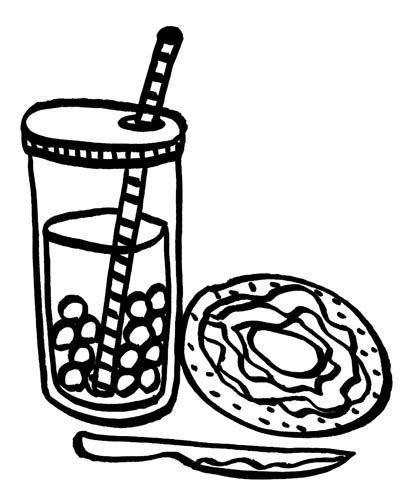
Oh, and also thinking about gelatinous cubes and oozes in the role-playing game sense – because those sort of seem like a weird hybrid between jellies and slime molds, as does The Blob. Any of those amoeba influenced creatures are horrific by their very nature – they don’t even need to be souped up, just ask anyone who’s had dysentery.
And one of the most interesting thing about slime molds is that they can take the shortest path to food even when confronted with very complex barriers. They are maze masterminds and would give the Minotaur more than a run for his money, especially if he had or was food. They have even proven capable of determining the most efficient paths for water lines or railways in metropolitan regions, which is kind of crazy when you really think about it. Check it out in Scientific American here. So, if we assume that this is essentially the model upon which The Blob was built, then it’s kind of a miracle anything got away. And slime molds are coming under closer scrutiny and study as alternative means of creating computer components are being explored.
Jellies are the Wave of the Future.
We are learning that there may be a myriad of uses for jellyfish from foodstuffs to cosmetic products as we rethink how we interact with them. They are even proving useful in cleaning up plastic pollution. I don’t know how I feel about the foodstuff angle for all that they’ve been a part of various recipes for a long time. From what I’ve seen of the jellyfish cookbook recipes, they just don’t look that appealing. But then again I hate boba with a passion, so I’m probably not the best candidate to consider the possibility.
So it seems that jellies are kind of the wave of the future as we find that they can help solve our problems. That’s pretty impressive for some brainless millions of years old critter condiments. Past – present – perpetuity! Who knows what else we’d have found if evolution hadn’t cleaned out the fridge every so often?
Feel free to check out more Nightmarish Nature here.

